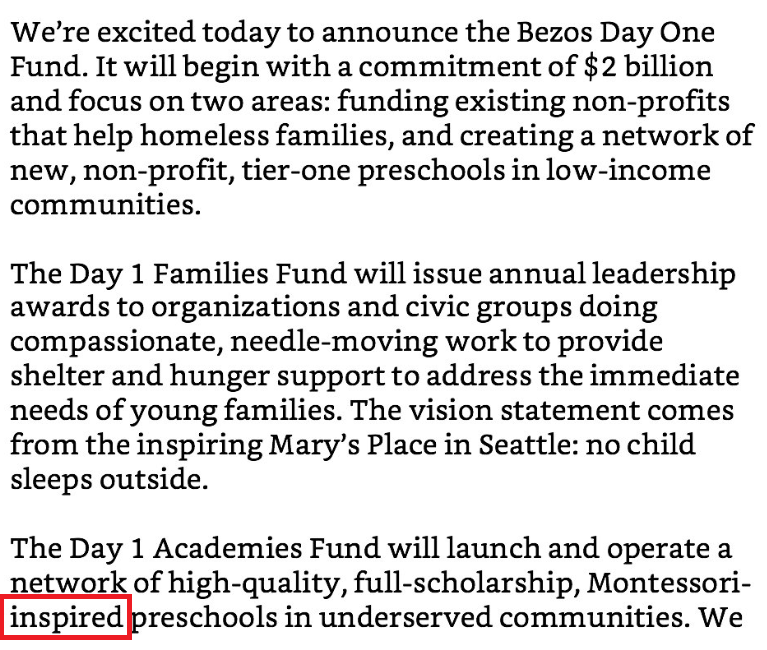Reaction has been “wary,” focusing mostly on the lack of detail in the announcement. (There was also one of those periodic meditations on tech moguls’ love affair with Montessori education.) The two professional organizations of Montessori educators—no doubt hoping for an unprecedented spotlight on and promotion of work they hold dear—issued statements that fizzed with enthusiasm (see here for AMI & AMS).
For my part, I was focused on one word in the announcement
I hope that Mr. Bezos and whoever he listens to on education matters are keeping in mind that the method has a lot of components, and, excepting the consequences of adding materials to the classroom, we don’t have data on outcomes when the method is tampered with.
What happens if you
- employ teachers who lack Montessori training? (There are thousands of teacher training programs in the US. Fewer than 25 offer Montessori training.)
- eliminate or shorten the 3 hour work cycle typical of Montessori preschool classrooms?
- eliminate or change the multi-year age groupings?
- eliminate or change Montessori scripted lessons? (Did you know that Montessori uses scripted lessons?)
- eliminate or change the curriculum?
- eliminate or change the Montessori conception of a prepared environment?
- change what is usually a high student-teacher ratio?
The Executive Director of the Yale Education Studies program wondered, in a New York Times op-ed, why Bezos didn’t make use of existing institutions to promote his preschool vision, rather than creating a network out of whole cloth? One obvious answer is that he wants tighter control to shape the organization as he sees fit, and to populate it with people he trusts.
Another likely reason is that he’s (rightly) suspicious that Montessori educators will be sticklers about the method, and he wants the flexibility to adapt the method as he sees fit. This may even be what he meant by another phrase in the brief announcement that drew a lot of attention: “the child will be the customer.”
Fair enough, it’s his money. But if that’s true, you may as well drop the “Montessori-inspired” bit.
Indeed, I’m predicting that picking and choosing elements of the Montessori toddler program (and not adopting it wholesale) will yield student outcomes (academic and social) that are indistinguishable from other preschools. I think the components interlock and all are integral to its success.
Montessori is, indeed, “inspiring” but using the education program as a jumping off point for your own homebrew will, I predict, disappoint.

 RSS Feed
RSS Feed